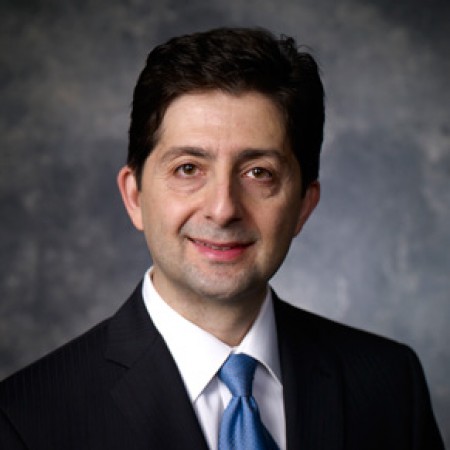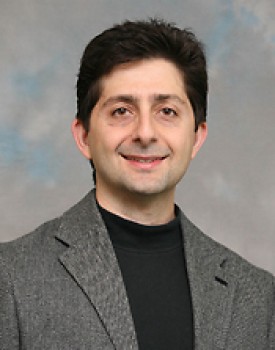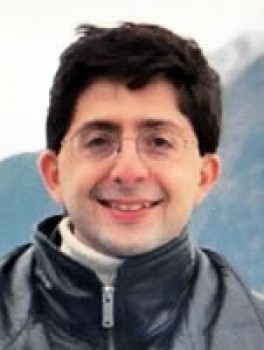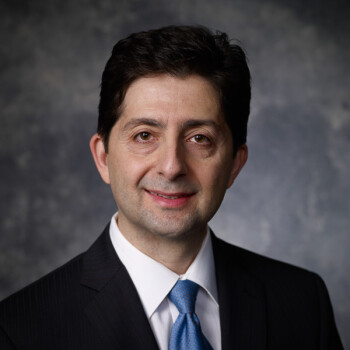Ph.D. - Electrical and Computer Engineering
University of Illinois at Urbana-Champaign - 1996

Aria Nosratinia
Erik Jonsson Distinguished Professor
Professor - Electrical Engineering
Professional Preparation
M.S. - Electrical Engineering
University of Windsor - 1991
University of Windsor - 1991
B.S. - Electrical Engineering
University of Tehran - 1989
University of Tehran - 1989
Research Areas
Research Interests
His interests lie in the broad area of information theory and signal processing, with applications in wireless communications and medical imaging.Publications
T. van Nguyen, A. Nosratinia, and D. Divsalar, ``Bilayer protograph codes for the half-duplex relay channel,'' accepted in IEEE Trans. Wireless Communications. forthcoming - Publication
A. H. Mehana and A. Nosratinia, ``Diversity of MMSE Receivers in MIMO Multiple Access Channels,'' accepted in IEEE Wireless Communications Letters. forthcoming - Publication
J. Li, W. Chen, A. Nosratinia, and J. Yuan, ``On the throughput-reliability tradeoff for amplify-and-forward cooperative systems,'' accepted in IEEE Trans. Communications. forthcoming - Publication
T. van Nguyen and A. Nosratinia, ``Rate-compatible Short-length LDPC Codes,'' accepted in IEEE Communications Letters. forthcoming - Publication
B. Xie, Y. Li, H. Minn, and A. Nosratinia, ``Adaptive Interference Alignment with CSI Uncertainty,'' IEEE Trans. Comm., vol. 61, no. 2, pp. 792-801, Feb. 2013. 2013 - Publication
Y. Li and A. Nosratinia, ``Spectrum Sharing with Distributed Relay Selection and Clustering,'' IEEE Trans. Comm., vol. 61, no. 1, Jan. 2013. 2013 - Publication
A. Hesham Mehana and A. Nosratinia, ``Single-Carrier Frequency-Domain Equalizer with Multi-Antenna Transmit Diversity,'' IEEE Trans. Wireless Communications, vol. 12, no. 1, Jan. 2013. 2013 - Publication
J. Li, W. Zhang, A. Nosratinia, and J. Yuan, ``SHARP: Spectrum Harvesting with ARQ Retransmission and Probing in Cognitive Radio,'' IEEE Trans. Communications, vol. 61, no. 3, pp. 951-960, March 2013. 2013 - Publication
Appointments
Associate Professor
The University of Texas at Dallas [2002–Present]
The University of Texas at Dallas [2002–Present]
Assistant Professor
The University of Texas at Dallas [1999–2002]
The University of Texas at Dallas [1999–2002]
Visiting Assistant Professor
Rice University [1996–1999]
Rice University [1996–1999]
Visiting Scholar
Princeton University [1995–1996]
Princeton University [1995–1996]
Additional Information
Honors and Awards
- National Science Foundation Career Award, 2000
- Senior member, IEEE
- Outstanding Service Award, IEEE Signal Processing Society, Dallas Chapter, 2001 and 2002
News Articles
Building a Better Cellphone
 If you’ve ever wished your cellphone had greater range, better sound quality and longer battery life, then rest assured Dr. Aria Nosratinia is doing what he can to make your dream come true. And for his efforts, the UT Dallas professor has been named an IEEE fellow, one of the highest honors bestowed by the Institute of Electrical and Electronics Engineers. The tribute recognizes him for more than 10 years of work in communication and information theory, particularly his ongoing work on what’s known as cooperative wireless communications.
If you’ve ever wished your cellphone had greater range, better sound quality and longer battery life, then rest assured Dr. Aria Nosratinia is doing what he can to make your dream come true. And for his efforts, the UT Dallas professor has been named an IEEE fellow, one of the highest honors bestowed by the Institute of Electrical and Electronics Engineers. The tribute recognizes him for more than 10 years of work in communication and information theory, particularly his ongoing work on what’s known as cooperative wireless communications.
Engineering, Business Professors Honored for Highly Cited Studies
Two professors from The University of Texas at Dallas were named to the 2016 list of Highly Cited Researchers from Clarivate Analytics, formerly the Intellectual Property and Science business of Thomson Reuters.Dr. Aria Nosratinia of the Erik Jonsson School of Engineering and Computer Science and Dr. Mike Peng of the Naveen Jindal School of Management are among the researchers recognized for having a significant global impact within their respective fields of study.
The list contains about 3,000 researchers in 21 fields of the sciences and social sciences. This year, the citation analysis focused on contemporary research achievement: Only highly cited papers in science and social sciences journals indexed in the Web of Science Core Collection during 2004-2014 were surveyed.
Electrical Engineer's Work May Signal Better Wireless Connections
To find methods that can improve wireless communication, UT Dallas electrical engineering professor Dr. Aria Nosratinia is investigating the technology that keeps us connected.To support this research, the National Science Foundation has awarded three grants totaling more than $2 million this fall.
“With the increased number of wireless devices, including future expectations for the Internet of Things, wireless space will become increasingly crowded. Addressing interference is crucial to the future of wireless Internet,” said Nosratinia, who is the associate head of the electrical engineering department in the Erik Jonsson School of Engineering and Computer Science.
UTD Professors Win $950,000 in NSF Grants For Research of Wireless, Optical Networks
 RICHARDSON, Texas (Nov. 15, 2004) – A group of engineering professors at The University of Texas at Dallas (UTD) has received two grants from the National Science Foundation (NSF) totaling $950,000 to conduct advanced research of wireless and optical communications networks.
RICHARDSON, Texas (Nov. 15, 2004) – A group of engineering professors at The University of Texas at Dallas (UTD) has received two grants from the National Science Foundation (NSF) totaling $950,000 to conduct advanced research of wireless and optical communications networks. One grant, a four-year, $450,000 award, will fund the search for “smarter” methods and principles that could enable wireless devices, including cellular phones and laptops, to act as potential relay points for other users’ transmissions, creating what has been termed “cooperative wireless networks” and improving the overall performance of wireless communications.
Dr. Aria Nosratinia Lands Almost $450,000 from NSF
 The National Science Foundation (NSF) awarded Dr. Aria Nosratinia $449,410 for his research on CIF: Small: Community Detection Meets Non-Graph Data: Principles and Applications. The project focuses on the development of the field of graph inference in the presence of non-graph data. Dr. Nosratinia’s research analyzes the information limits of label recovery with side information and explores how side information affects the limits of efficient local algorithms such as belief propagation, as well as other efficient algorithms such as semi-definite programming.
The National Science Foundation (NSF) awarded Dr. Aria Nosratinia $449,410 for his research on CIF: Small: Community Detection Meets Non-Graph Data: Principles and Applications. The project focuses on the development of the field of graph inference in the presence of non-graph data. Dr. Nosratinia’s research analyzes the information limits of label recovery with side information and explores how side information affects the limits of efficient local algorithms such as belief propagation, as well as other efficient algorithms such as semi-definite programming.